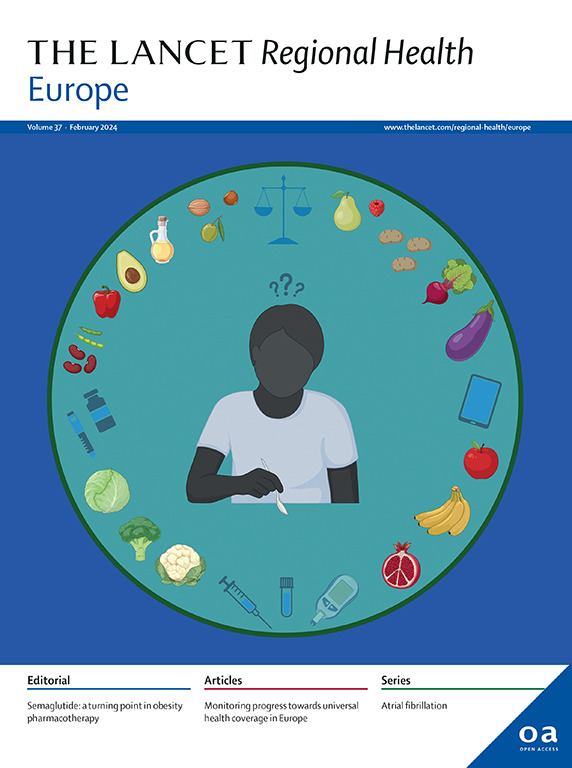Clinical and functioning outcomes during the establishment phase of Ukraine's community mental health teams: a descriptive analysis
IF 13
Q1 HEALTH CARE SCIENCES & SERVICES
引用次数: 0
Abstract
Background
Ukraine's nationwide Community Mental Health Teams (CMHTs) programme is key to Ukraine's ongoing mental healthcare reform. No studies to date, however, have reported on the impact of Ukrainian CMHTs on service user clinical recovery. This study has two aims: (i) describe who the Ukrainian CMHTs are enrolling, which services they most provide, and where they are provided and (ii) identify whether any clinical and/or functional improvements were detectable among service users after six CMHT visits (intake + five follow-up visits) and, if so, identify principal predictors of such improvements.
Methods
947 CMHT service users enrolled between April–December 2021 were assessed on clinical outcomes using the Clinical Global Improvement scale (CGI) and functional outcomes using WHO's Disability Assessment Schedule (WHODAS 2·0). Chi-square and Wilcoxon signed-rank tests were used to assess changes in CGI and WHODAS scores, respectively, at the fifth (or fourth) follow-up CMHT visit. Hierarchical multinomial logistic regression and hierarchical multiple linear regression identified predictors of clinical and functional improvement, respectively.
Findings
Most service users were male, unemployed, and diagnosed with schizophrenia spectrum disorders. Among service users with available outcome data at both CMHT intake and the fifth (or fourth) follow-up visit, a significant decrease in disability scores was observed (Medianintake = 62·50, Medianfollow-up = 58·33, z = −6·27, p < 0·001) and most service users' illness severity stabilised (n = 451/742, 60·8%) or improved (n = 243/742, 32·6%). Clinical stabilisation (compared to worsening) was predicted by being male and living <20 km from the CMHT office, while improvement was predicted by frequent receipt of pharmacological support and receiving CMHT care in non-conflict-exposed regions. Functional improvement was predicted by living between 20 and 100 km from the CMHT office, having a somatic comorbidity, more frequent receipt of psychosocial services for the service user's family, and more support for community integration.
Interpretation
We found positive results associated with enrolment in Ukraine's CMHTs. Recommendations for future research and improvements to the CMHT programming are provided.
Funding
Funded as part of the World Health Organization's Special Initiative for Mental Health.
乌克兰社区精神卫生小组建立阶段的临床和功能成果:描述性分析
乌克兰全国性的社区精神卫生小组(CMHTs)方案是乌克兰正在进行的精神卫生保健改革的关键。然而,迄今为止没有研究报告乌克兰cmts对服务使用者临床康复的影响。本研究有两个目的:(i)描述乌克兰CMHT正在招募谁,他们最提供哪些服务,以及在哪里提供服务;(ii)确定在6次CMHT就诊后(入院+ 5次随访),服务使用者是否可以检测到任何临床和/或功能改善,如果有,确定这种改善的主要预测因素。方法采用临床全球改善量表(CGI)和世界卫生组织(WHO)残疾评估表(WHODAS 2.0)对2021年4月至12月登记的947名CMHT服务用户的临床结果进行评估。分别使用卡方检验和Wilcoxon符号秩检验来评估第五次(或第四次)CMHT随访时CGI和WHODAS评分的变化。层次多项式逻辑回归和层次多元线性回归分别确定了临床和功能改善的预测因子。研究发现,大多数服务使用者是男性,失业,并被诊断患有精神分裂症谱系障碍。在接受CMHT治疗和第五次(或第四次)随访时均有结果数据的服务使用者中,观察到残疾评分显著下降(Medianintake = 62.50, median随访= 58.33,z = - 6.27, p < 0.001),大多数服务使用者的疾病严重程度稳定(n = 451/742, 60.8%)或改善(n = 245 /742, 32.6%)。临床稳定(与恶化相比)通过男性和居住在距离CMHT办公室20公里的地方来预测,而在非冲突暴露地区频繁接受药物支持和接受CMHT护理可以预测改善。居住在距离CMHT办公室20至100公里的地方,患有躯体合并症,更频繁地接受服务使用者家庭的社会心理服务,以及更多地支持社区融入,可以预测功能改善。我们在乌克兰的CMHTs中发现了积极的结果。提出了今后研究和改进CMHT规划的建议。作为世界卫生组织精神卫生特别倡议的一部分提供资金。
本文章由计算机程序翻译,如有差异,请以英文原文为准。
求助全文
约1分钟内获得全文
求助全文
来源期刊

Lancet Regional Health-Europe
Multiple-
CiteScore
19.90
自引率
1.40%
发文量
260
审稿时长
9 weeks
期刊介绍:
The Lancet Regional Health – Europe, a gold open access journal, is part of The Lancet's global effort to promote healthcare quality and accessibility worldwide. It focuses on advancing clinical practice and health policy in the European region to enhance health outcomes. The journal publishes high-quality original research advocating changes in clinical practice and health policy. It also includes reviews, commentaries, and opinion pieces on regional health topics, such as infection and disease prevention, healthy aging, and reducing health disparities.
 求助内容:
求助内容: 应助结果提醒方式:
应助结果提醒方式:


